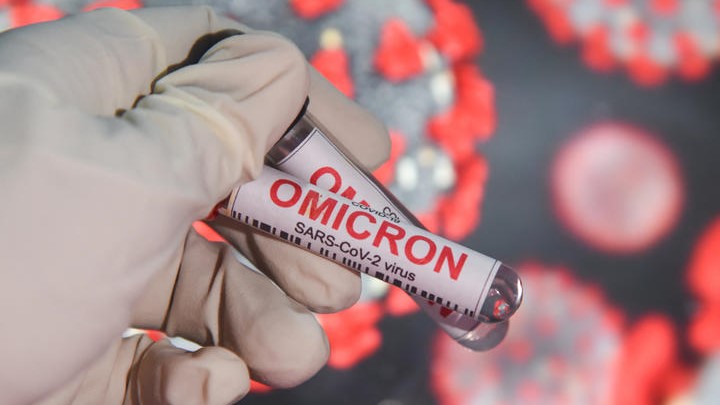Could Omicron be a good thing?
Saturday 29 January 2022 | Written by Supplied | Published in On the Street, Opinion

Omicron is number 15 in the alphabet and is interesting. It actually means “little o” as opposed to the final number 24 Omega which means “big O”. PHOTO: AFP/22012822
The reason some authorities view Omicron positively is that it has very high transmissibility (although interestingly not as transmissible as measles) but probably low pathogenicity, writes Associate Prof John Dunn FRACS (Ngati Terei).
Over the last two years we have all become reluctant experts in a whole new lexicon. Do we really need to know the meaning of transmissible, pathogenic, RT-PCR, RAT, mRNA, DNA, ICU, myocarditis, chronicity, mutation, genomic sequencing, epidemiology and multi-organ failure? For informed debate, we do.
If you’re thinking “that’s all Greek to me” well the naming system for significant variants certainly is. When concerning, they are sensibly called Variants of Concern (VOC). The melodic 24 letters of the Greek alphabet have been employed to identify them.
The original SARS-CoV-2 is termed “wild type” - a name I quite like. The first VOC was obviously Alpha, and was worse. Delta is a lot worse. It’s more transmissible and more pathogenic (more catch it and more get very sick).
Omicron is number 15 in the alphabet and is interesting. It actually means “little o” as opposed to the final number 24 Omega which means “big O”. Hopefully the virus knows it’s Greek and stops there. We’re two thirds down the track.
We rapidly passed nu (not a coconut) and ahead lies sigma (not a Mitsubishi).
The reason some authorities view Omicron positively is that it has very high transmissibility (although interestingly not as transmissible as measles) but probably low pathogenicity. In other words, everyone gets it but not many die. This is supported by a very recent online Lancet paper from South Africa where it was first described just three months ago.
A week is a long time in politics but especially in a pandemic. Within a month it had spread to 87 of the world’s 195 countries and effectively pushed Delta aside. That’s why it’s liked.
The absolute best scenario is that we have replaced an organ-destroying catastrophic illness with a milder flu-like condition, which is what most coronaviruses cause, while it busily spreads through a population creating immunity.
For that reason, it’s been termed “God’s vaccine”. It will “tidy up” the unvaccinated giving them antibodies and an effective T cell response. Unfortunately some, a small number, will get very sick or die. For the vaccinated, they are far less likely to get infected or, if they are, the severity will be much much reduced.
There are only two ways to get immunity: the vaccine or the virus. So called “natural immunity” cannot be obtained by a healthy lifestyle, vitamins or (bizarrely) mouthwashes as claimed by some. It can only come from the “natural” Russian roulette of getting Covid.
The absolute best immunity comes from full three dose Pfizer vaccination plus getting a hopefully mild infection.
No one knows the future. I predicted in January 2020, while sitting with friends in the Titikaveka lagoon having a beer, that this would be a five-year saga. Now two years in, I suspect that is accurate. The next year will be Omicron doing its thing, the next will be economies and social structures rebuilding and the next fully reestablishing a global network.
Viruses settle down in the end, probably by mutating themselves out of the danger zone. The Spanish flu, after killing 25-50 million people, just went away one day.
“Global pandemic” is a meaningless tautology (saying things twice) because pandemics are by definition global. An epidemic is a short sharp spike of disease, often extremely serious like measles in Samoa, but it then quickly disappears. Endemic roughly means “living with it”. The disease settles to a hopefully less pathogenic steady state. It hangs around, doesn’t get too nasty and may require an annual booster like flu.
Ebola never became a pandemic because it’s too pathogenic. It kills over 80 per cent of victims so it never got a chance to leave the Congo. Covid is so successful because at worst it only kills 2 per cent (0.2 per cent if vaccinated) and so it had a chance to spread. And boy did it.
And so I have hope for the future, which may or may not be delivered to us by Omicron. To quote the baseball-playing philosopher Yogi Bera “the future ain’t what it used to be”. Here in Cook Islands, and also largely in NZ, we have hovered above the world stage watching in horror and fascination but taking notes. Hopefully the gale is subsiding, the debris getting cleared, and it’s time to step back out into the weather and carefully rejoin our neighbours.
- Auckland-based Associate Prof John Dunn FRACS (Ngati Terei) is a visiting surgeon at Rarotonga Hospital. He and his wife Rose have business and philanthropic interests in New Zealand and the Cook Islands.












































